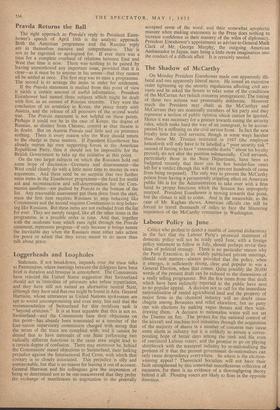The Shadow of McCarthy'
On Monday President Eisenhower made one apparently illi- beral and one apparently liberal move. He issued an executive order tightening up the security regulations affecting civil ser- vants and he asked the Senate to relax some of the conditions of the McCarran Act (which concerns immigration). The timing of these two actions was presumably deliberate. However much the President may chafe at the McCarthys and McCarrans they are nominally members of his party and they represent a section of public opinion which cannot be ignored. Hence it was necessary for a gesture towards easing the security rules, which make hard the way of an immigrant, to be accom- panied by a stiffening on the civil service front. In fact the new loyalty tests for civil servants, though in some ways harsher than those Mr. Truman instituted in 1947 (the employee henceforth will only have to be labelled a " poor security risk " instead of having to have " reasonable doubt " about his loyalty proved), do not alter the position substantially. Civil servants, particularly those in the State Department, have been so badgered recently that there can be few border-line cases left for a verdict (though this will not prevent hundreds of cases from being reopened). The only way to prevent the McCarthy poison from having a permanently crippling effect on American public life is for the Administration to take over with a firm hand its proper functions which the Senator has improperly usurped. President Eisenhower is moving towards that point, but the climax is still to come. And in the meanwhile, as the case of Mr. Kaghan shows, American officials can still be forced to travel thousands of miles to face the blustering inquisition of the McCarthy committee in Washington.


































 Previous page
Previous page